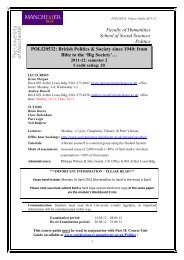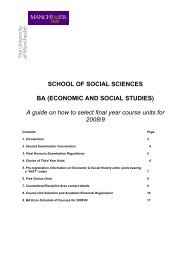CHNN 22, Spring 2008 - School of Social Sciences
CHNN 22, Spring 2008 - School of Social Sciences
CHNN 22, Spring 2008 - School of Social Sciences
Create successful ePaper yourself
Turn your PDF publications into a flip-book with our unique Google optimized e-Paper software.
would not have known this. Or would it merely have been that he would not have<br />
troubled to remind himself that he knew? The legs <strong>of</strong> the Government, though<br />
rheumaticky, were stout enough. Nothing would transpire to upset it. Like a dirtbug, it<br />
squatted athwart all England, and so would continue to squat. He was mouthing<br />
revolutionary bunkum, proletarian pap.<br />
Gibbon says much the same thing in his own words about literature in his contribution to Left<br />
Review. ‘To say that the period from 1913 to 1934 is a decadent period is just, if I may say so,<br />
bolshevik blah.’ 20<br />
Later in Grey Granite Ellen Johns describes Trease and Selden as ‘liars and not to be trusted’<br />
(p120) and claims that the party is ‘full <strong>of</strong> cheats and liars’ (p194) but these may be generic<br />
expressions for politicians. In Cloud Howe Chris also refers to ‘liars and cheats called Labour or<br />
Tory…’ (p198).<br />
The only instance <strong>of</strong> deliberate lying in Grey Granite is Ewan’s suggestion that the explosion at<br />
Gowans and Gloag has been deliberately planned to test the effect <strong>of</strong> poison-gas on a crowd. Ellen<br />
protests: ‘…but, Ewan, you know that THAT was a lie. It was sickening <strong>of</strong> you to suggest that they<br />
let loose the gas deliberately... Ewan, it’s just cheating, it’s not Communism!’ (p188) Marion Nelson<br />
did not refer to this area.<br />
The charge <strong>of</strong> lying has <strong>of</strong>ten been made in respect <strong>of</strong> communist policy. In Double Lives Stephen<br />
Koch uses the expression ‘lying for the truth’ and the phrase is the title <strong>of</strong> the first half <strong>of</strong> the book<br />
and <strong>of</strong> a specific chapter. ‘Willi [Münzenberg] may have honestly believed that he was lying for the<br />
truth, but he did clearly know he was lying.’ 21<br />
One <strong>of</strong> the first instances was the lie that the Whites had taken Kronstadt led by the counterrevolutionary<br />
General Kozlovski whereas in fact the Kronstadt sailors had mutinied led by the<br />
Kronstadt Soviet. Gibbon shows that he was fully aware <strong>of</strong> the suppression <strong>of</strong> the Kronstadt Soviet<br />
in March 1921 in Stained Radiance (p62), but whether he was aware <strong>of</strong> the lying is unknown.<br />
Victor Serge wrote later, ‘For the Party to lie to us this way was something new.’ <strong>22</strong> But in the early<br />
years <strong>of</strong> the revolution even he was quoted as saying: ‘We are obliged to lie to save what can be<br />
saved <strong>of</strong> the Revolution.’ 23<br />
Plisnier and Silone make several references to lying. In Memoirs <strong>of</strong> a Secret Revolutionary Iegor,<br />
the Comintern delegate, says: ‘There are higher values than the truth, comrade.’ 24 Silone reports<br />
that, at a meeting <strong>of</strong> a special commission <strong>of</strong> the Comintern, the British delegate’s interruption<br />
(‘But that would be a lie’) was greeted with a burst <strong>of</strong> laughter. 25 (It is remarkable now to note that,<br />
from the identification <strong>of</strong> a code-name in the OVRA files, Silone may have been giving information<br />
to the fascist police in Italy at the time he was a delegate to the Comintern in Moscow.) 26<br />
In the essay referred to above Jack Mitchell comments <strong>of</strong> the ‘adventurism’ <strong>of</strong> Ewan’s lie about the<br />
gas explosion (and other features): ‘There’s no sign <strong>of</strong> the author distancing himself from his hero<br />
at these points.’ 27<br />
The question <strong>of</strong> Gibbon’s authorial stance was raised most recently by James D Young in his<br />
chapter on Gibbon and Barke in The Very Bastards <strong>of</strong> Creation in which he argued that Gibbon<br />
‘was really mocking and ridiculing Stalinist orthodoxy when he discussed the CPGB’s idea <strong>of</strong> “the<br />
vanguard Party’s” role and falsification <strong>of</strong> classical Marxism in trying to exploit working folk as<br />
“History’s instruments”’. 28<br />
Dr Young gives a source for his references in Trotsky’s speech to the Thirteenth Congress <strong>of</strong> the<br />
CPSU in May 1924 when he was under attack from Zinoviev:<br />
‘In the last instance the Party is always right, because it is the only historic<br />
instrument which the working class possesses for the solution <strong>of</strong> its fundamental<br />
tasks. […] One can be right only with the Party and through the Party because history<br />
has not created any other way for the realisation <strong>of</strong> one’s rightness.’ 29<br />
Gibbon was certainly aware <strong>of</strong> the full meaning <strong>of</strong> ‘History’s instruments’. Ewan had said:<br />
47
















